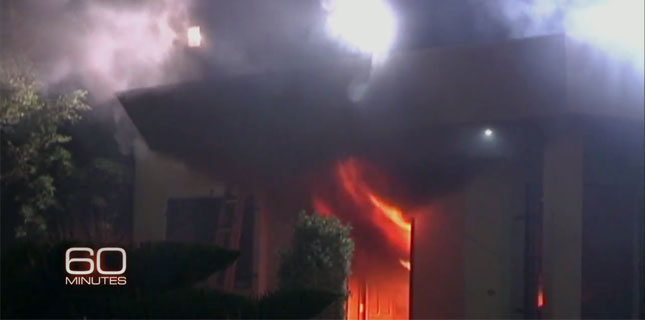
Daily Beast contributor Eli Lake claimed that the Obama administration might have committed a “serious blunder” in its response to the terrorist attacks in Benghazi by not sending enough military support. But Lake's claim, based on a Republican-led fixation on the timeline of events, never takes into account that military leaders have said they were unable to respond any faster or with any more force than they did that night.
Lake highlighted concerns raised by Republican Rep. Devin Nunes (CA) who speculated in a letter to Speaker John Boehner that there was no lull in fighting in between attacks on the U.S. compound the night of September 11, 2012. The official timeline of events established that the attacks occurred in two waves, with an initial attack on the main facility and a second attack on an annex building more than four hours later. Lake entertained Nunes' theory, and wrote that the absence of a lull between those attacks could raise legitimate questions about the military's response:
If there was a lull in the fighting that night, as the [State Department's Accountability Review Board] report states, more air support or specialized counter-terrorism teams would likely not have made much of a difference. If the fighting continued throughout the night, however, or the witnesses allegedly say, the decision not to send more backup that evening would be a more serious blunder.
But the extent of a lull in fighting is entirely beside the point. Military experts have repeatedly testified that the response represented the best of our military's capabilities.
Then-Secretary of Defense Leon Panetta ordered the Marine Corps' Fleet Antiterrorism Security Team (FAST), stationed in Spain, to get to Libya “as fast as you can” as soon as the first attack began. Their ability to respond began at that point. Fred Bruton, a former diplomatic security agent, and Samuel M. Katz, a journalist, explained the logistical issues at play that are far more relevant than the lull Lake fixates on:
There was never a question concerning U.S. resolve or the overall capabilities of the U.S. military to respond to Benghazi. There was, however, nothing immediate about an immediate response. There were logistics and host-nation approvals to consider. An immediate response was hampered by the equation of geography and logistics.
Former Secretary of Defense Robert Gates, who has said that criticisms of the military's ability to respond quickly enough that night are based on a “cartoonish impression of the military,” has also said that he “would not have approved sending an aircraft, a single aircraft” over Benghazi given safety concerns about “the number of surface to air missiles that have disappeared from Qaddafi's arsenals.” According to Gates, getting a force to Benghazi from outside the country “in a timely way would have been very difficult if not impossible.”
Lake never explains how the absence of a lull in fighting would have changed the equation in any meaningful way.
There were special forces stationed in Tripoli, but the commander of Special Operations Command Africa ordered the troops to stay in Tripoli because they were needed to protect the embassy. Regardless of this decision, they would not have been able to get to Benghazi before the second attack concluded. An interview of a diplomatic official in Tripoli by congressional investigators established that the flight these special forces were scheduled to take, but did not, was to take off after 6:00 a.m., local time -- approximately 45 minutes after the attack at the CIA annex that killed two people.
Military experts including Panetta, Chairman of the Joint Chiefs of Staff Gen. Martin Dempsey, and former Chairman of the Joint Chiefs retired Admiral Mike Mullen, all agree that the military did everything they possibly could that night.
In fact, even Republicans on the House Armed Services Committee have determined there's no evidence to suggest aid was withheld because of a quick first attack. From an April report (emphasis added):
The House Armed Services Committee also examined the question of whether the Defense Department failed to deploy assets to Benghazi because it believed the attack was over after the first phase. The progress report finds that officials at the Defense Department were monitoring the situation throughout and kept the forces that were initially deployed flowing into the region. No evidence has been provided to suggest these officials refused to deploy resources because they thought the situation had been sufficiently resolved.
For more on conservative media myths about the September 2012 attack, read The Benghazi Hoax, the new e-book by Media Matters' David Brock and Ari Rabin-Havt.